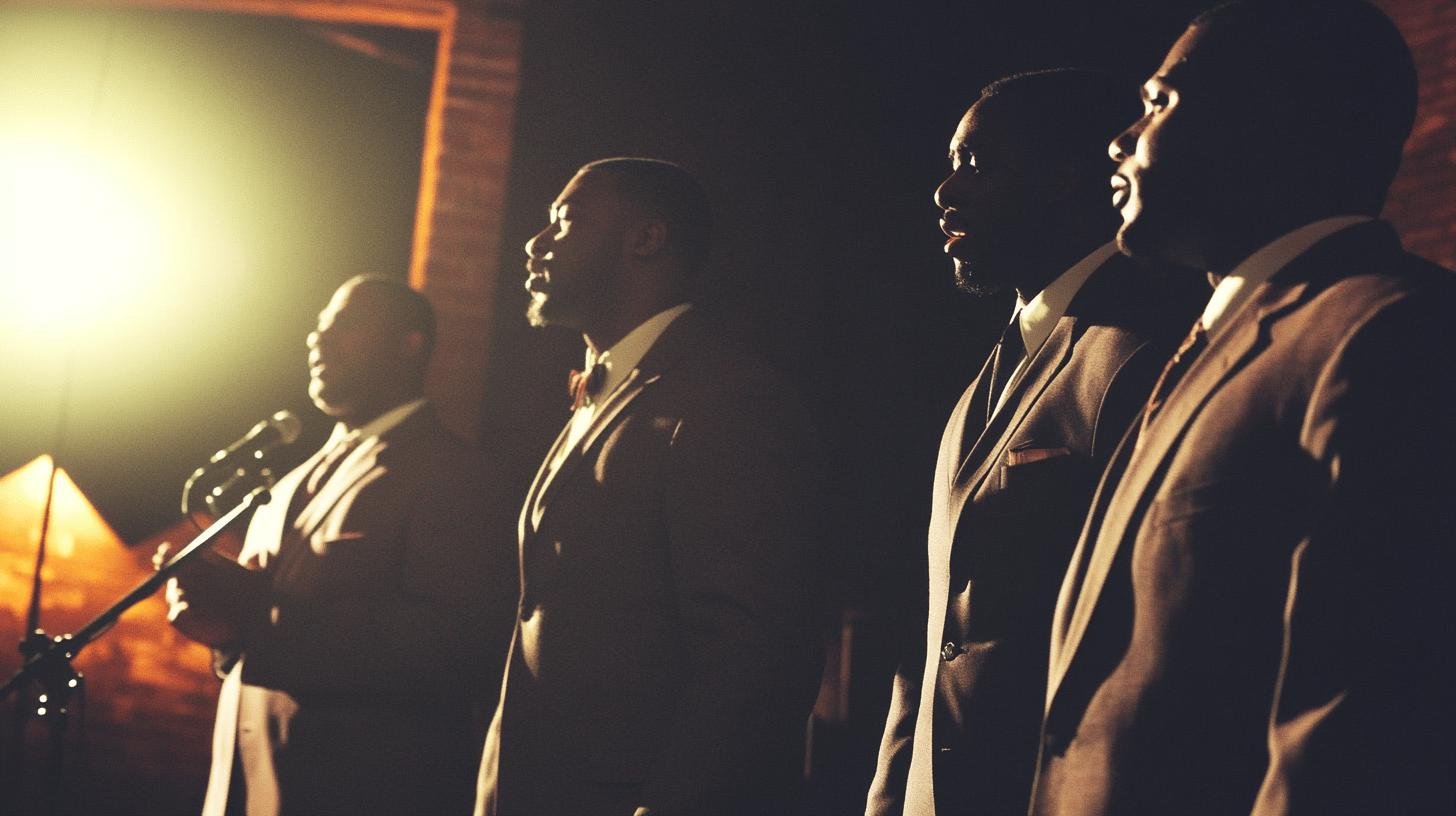Ever thought about why gospel quartets sound different based on where they’re from? It’s like tasting the same dish cooked in different kitchens—each has its own flavor! Gospel music might have started in African American churches in the early 1900s, but over time, different areas have sprinkled their own magic into it. Let’s uncover the mystery behind these unique regional styles. Stick around, and we’ll explore how Southern Gospel, with its country flair, and African American spirituals from the deep south, have shaped the gospel quartets we know and love today.
The Harmony Techniques That Define Gospel Quartets

Ever wonder how gospel quartets create such rich, soul-stirring sounds? It all goes back to their roots in African American spirituals and the blues. These genres were born in the African American church, bringing musical elements like call-and-response and improvisation to the forefront. This blend of styles laid the groundwork for the harmony techniques we cherish today. As gospel music evolved, these harmonies became more intricate, blending emotional depth with technical skill. These vocal arrangements are a testament to the enduring power of faith and hope, deeply resonating with anyone who listens.
Here are the key harmony elements that make gospel quartets stand out:
- Call-and-response: This interactive style creates a dynamic conversation within the music.
- Close harmonies: Tight, closely knit harmonies produce a warm and full sound.
- Acapella techniques: Singing without instrumental backing highlights the pure vocal prowess of the quartet.
- Layered vocals: Different vocal parts create a rich tapestry of sound, adding depth to the performance.
- Improvisation: Spontaneous vocal riffs and runs bring a fresh, lively feel to the music.
- Syncopation: Unexpected rhythmic patterns keep listeners engaged and on their toes.
The magic of these harmonies lies in their ability to convey spiritual themes and connect with audiences on a deep level. Each technique serves as a vessel for messages of faith, hope, and liberation. It’s no wonder these quartets can move people to tears or inspire joyous celebration. Now you try it! Next time you listen to a gospel quartet, focus on the harmonies and see if you can identify these techniques.
African American Spirituals and Their Impact on Gospel Quartets

African American spirituals, created by enslaved Africans in the 17th and 18th centuries, are the heartbeat of gospel music. What makes these spirituals so significant? Their simplicity, emotional depth, and call-and-response style. These elements were not just musical; they were a form of resistance and resilience, carrying messages of faith, hope, and liberation. The spirituals laid the groundwork for gospel music, and their influence is undeniable in the rich vocal harmonies and themes that gospel quartets continue to celebrate today.
The Fisk Jubilee Singers played a key role in spreading these spirituals beyond their origins. Who were they? A group from Fisk University who toured in the 1870s, introducing spirituals to a wider audience. They didn’t just sing songs; they preserved a tradition, ensuring that the emotional and cultural depth of spirituals reached ears across the globe. Their efforts shone a light on the significance of spirituals, helping to shape the path for future gospel quartets.
The Social Impact of Gospel Music
Gospel music has been a powerful tool for social and political activism. How did it serve this role? By providing anthems for movements like the Civil Rights Movement, gospel music united people in the fight for equality. Its messages of hope and freedom resonated deeply, inspiring change and giving courage to those who stood up for justice. The legacy of gospel music as a force for social good continues, reminding us of its profound impact on society.
Today, African American spirituals still influence modern gospel quartets. How so? Their themes of hope and liberation are woven into the fabric of gospel music, inspiring new generations of quartets. These spirituals provide a rich tapestry of sound and meaning, allowing quartets to connect with audiences on emotional and spiritual levels. As these quartets perform, they carry forward the legacy of spirituals, ensuring that their powerful messages continue to inspire and uplift.
Contemporary Gospel Quartet Styles and Innovations

Modern gospel quartets are shaking things up by blending diverse musical styles and embracing new technologies. Ever heard gospel mixed with hip-hop or electronic beats? Yep, that’s happening! This fusion is opening up gospel music to a whole new audience. By incorporating R&B and other popular genres, quartets are reaching listeners who might not have connected with traditional gospel sounds. They’re not just sticking to the old ways but are using social media, streaming platforms, and even virtual reality to share their music far and wide. This tech-savvy approach is making gospel music more accessible and exciting for everyone.
Why are collaborations and genre-blending so important? They keep gospel music fresh and relevant. By working with secular artists, gospel quartets can spread their message to a broader crowd. This cross-genre collaboration helps bridge the gap between different musical worlds, creating something unique and powerful. It’s a win-win situation: gospel music gets to stay in the spotlight, and fans get to experience a blend of sounds that might just lift their spirits in unexpected ways. Now you try it! Check out a modern gospel quartet online and see how they’re mixing it up.
Final Words
Exploring the Unique Styles of Regional Gospel Quartets shows us how rich and diverse gospel music really is. From the deep roots of African American spirituals to the lively energy of Southern Gospel, we see how different regions have crafted their unique styles.
These influences have shaped gospel quartets and kept the music fresh and exciting. Harmony techniques and the legacy of influential quartets add depth to this musical genre.
Today’s gospel quartets are mixing it up with new styles, ensuring this music continues to inspire and connect people everywhere.
FAQ
What are the 4 distinct styles of gospel music?
Gospel music encompasses many styles, but the four biggies are Traditional Gospel, Contemporary Gospel, Southern Gospel, and Quartet Gospel. Each style offers unique vibes, making gospel diverse and soulful.
What is quartet style gospel?
Quartet style gospel is all about harmony and a cappella singing. It’s typically performed by four singers, each taking a distinct vocal range. The songs often carry messages of faith and hope.
How was the Statesmen Quartet unique among gospel singing quartets?
The Statesmen Quartet stood out with their blend of showmanship and innovative vocal harmonies. Their lively performances and smooth renditions made them a huge hit and influenced future gospel quartets.
What two different musical styles were influenced by gospel music?
Gospel music has been a game-changer for both R&B and rock ‘n’ roll. Its soulful melodies and rhythms gave these genres the roots and emotional depth they’re known for.
